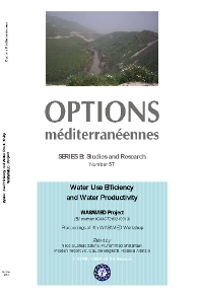| Article précédent | p. 137-151 | Article suivant |
Effects of deficit irrigation on yield and water use efficiency of some crops under semi-arid conditions of the Bekaa valley of Lebanon
A six-year experiment (1998-2003) was conducted at Tal Amara Research Station in the Bekaa Valley of Lebanon to determine water use, yield and water use efficiency in four annual crops with contrasting response to deficit irrigation (DI). Crop evapotranspiration (ET) was measured using drainage and weighing lysimeters. In the plots, ET was measured using a simple soil water balance model. Yield and its components were determined in sampling areas reserved for harvest. Water use efficiency at grain (WUEg) or seed (WUEs) basis was calculated as the ratio of dry yield to crop evapotranspiration (Y/ET), while water use efficiency at biomass-basis (WUEb) was calculated as the ratio of dry biomass to ET (B/ET). For cotton, water use efficiency (WUEl) was calculated as the ratio of dry lint yield to ET. Furthermore, the relationships between yield (Y) and biomass (B) in one hand, and crop evapotranspiration (ET) in the other hand were examined using linear models.
- [ Afficher ]
- [ Télécharger ]
- [ Exporter la citation ]
Vous pouvez télécharger la citation au format :
- [ Imprimer ]
-
Mots-clés
BIOMASSE, COMPOSANTE DE RENDEMENT, EFFICACITE, EVAPOTRANSPIRATION, LIBAN, LYSIMETRE, METHODE D'IRRIGATION, RENDEMENT DES CULTURES, UTILISATION DE L'EAUCiter cet article
Karam F., Karaa K., Tarabey N. Effects of deficit irrigation on yield and water use efficiency of some crops under semi-arid conditions of the Bekaa valley of Lebanon. In : Lamaddalena N. (ed.), Shatanawi M. (ed.), Todorovic M. (ed.), Bogliotti C. (ed.), Albrizio R. (ed.). Water use efficiency and water productivity: WASAMED project. Bari : CIHEAM, 2007. p. 137-151. (Options Méditerranéennes : Série B. Etudes et Recherches; n. 57). 4. WASAMED (WAter SAving in MEDiterranean agriculture) Workshop, 2005/09/30-2005/10/04, Amman (Jordan). http://om.ciheam.org/om/pdf/b57/00800783.pdf



